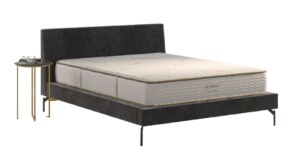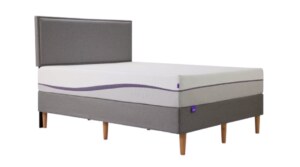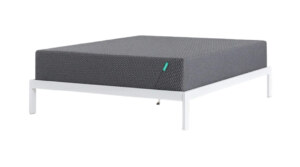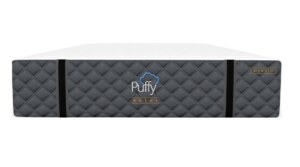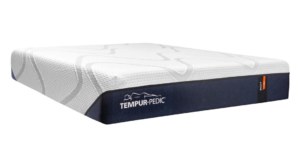Best Mattresses for Older Adults with Arthritis and Joint Pain
AgingInPlace.org keeps our resources free by working as an affiliate partner with some companies mentioned on our site. These partnerships or the commission we may earn do not affect our opinions or evaluations of the products we mention. Our reviews are solely based on our research methodology and from input from our AgingInPlace.org Advisory Board. Learn more about our ad policies.
Best Mattresses for Older Adults with Arthri...
Products carousel
Key Takeaways:
- The level of firmness in a mattress plays an important role in helping with specific arthritis issues by providing various levels of support.
- When choosing your mattress, take into account your sleeping position. Different mattresses can be better for certain sleeping positions.
- Mattresses offer varying levels of body temperature control, so whether you sleep hot or cold will have an impact on what mattress is more suitable for you.

Roughly 22% of all Americans have some form of arthritis—that’s about 59 million people nationwide, with those who are over 65 being the highest at-risk group. The most common form of this degenerative joint disease is osteoarthritis, which occurs when the cartilage at the end of the joints wears down causing bone-on-bone friction leading to pain, aching, stiffness, and swelling. The second most common form is rheumatoid arthritis, which is categorized as an autoimmune disease in which the body mistakenly attacks its own joint tissue. Other types of arthritis are psoriatic arthritis and gout. Regardless of the diagnosis, the disease progresses over time and leaves older adults at risk for complications.
According to Medical News Today, researchers have found that arthritis can be worse during nighttime hours when the body produces less cortisol, which can lead to inflammation and pain. Those with arthritis may also be sleeping in positions that put more pressure on already stiff and swollen joints. But the biggest culprit of all might be your mattress.
There are two things to look for in a mattress for arthritis: support for the spine and pressure relief for the joints. While some mattresses do one job better than the other, it’s important to find a mattress that does a good job of both. In this article, we feature the best mattresses for seniors with arthritis in several different categories, highlighting product details, pros, cons, pricing, and more.
Top Picks:
- Best Value: Saatva Loom and Leaf Mattress
- Best Luxury: Helix Midnight Luxe Mattress
- Best for Pressure Relief: Purple Plus Mattress
- Best on a Budget: Zoma Hybrid
- Best for Couples: Tuft and Needle Mint Mattress
- Best for Side Sleepers: Puffy Royal Mattress Hybrid
- Best Cooling: Tempur-Pedic TemperLUXBreeze Mattress
- Best for Back Pain: Casper Wave Hybrid Mattress
- Most Comfortable: Bear Elite Hybrid Mattress
- Best for Spinal Alignment: DreamCloud Luxury Hybrid Mattress
Best Mattress Comparison Table
We broke down each mattress by price, mattress type, sizes available, level of firmness, sleep trials available, material, and shipping:
| Model | Price range | Mattress type | Size | Warranty | Firmness level | Trial offers | Materials | Shipping |
|---|---|---|---|---|---|---|---|---|
| Saatva Loom and Leaf Mattress | $1,095– $2,915 | Memory foam |
| Limited lifetime |
| 365-night trial |
|
|
| Helix Midnight Luxe Mattress | $1,099–$2,299 | Hybrid memory foam and coil |
| 10–15 years | Medium | 100-night |
|
|
| Purple Plus Mattress | $1,199 –$2,898 | Hybrid |
| 10 years | Medium | 100-night |
|
|
| Zoma Hybrid | $699– $1,598 | Hybrid |
| 10-year | Medium | 100-night |
|
|
| Tuft and Needle Mint Mattress | $1,045– $1,845 | Memory Foam |
| 10 years | Medium-to-firm | 100-night |
|
|
| Puffy Royal Mattress Hybrid | $2,099–$3,449 | Hybrid |
| Limited lifetime warranty | Medium-to-firm | 101-night |
|
|
| Tempur-Pedic Luxbreeze Mattress | $4,899– $9,798 | Memory foam |
| 10-year |
| 90-night |
|
|
| Casper Wave Hybrid Mattress | $1,795–$3,495 | Hybrid |
| 10-year | Medium | 100-night |
|
|
| Bear Elite Hybrid Mattress | $1,291–$2,674 | Hybrid |
| Limited lifetime warranty |
| 120-night |
|
|
| DreamCloud Mattress | $699–$1,299 | Hybrid |
| Limited lifetime warranty |
| 365-night |
|
|
| Model | ||||||||||||||||||||||||||||||||||||||||||||||||||||||||||||||||||||||||||||||||||||||||||||||||||||||||||||||||||||||||||||||||||||||||||||||||||||||||||||||||||||||||||||||||||||
| Saatva Loom and Leaf Mattress | Price range | $1,095– $2,915 | Mattress type | Memory foam | Size |
| Warranty | Limited lifetime | Firmness level |
| Trial offers | 365-night trial | Materials |
| Shipping |
|
|---|
| Helix Midnight Luxe Mattress | Price range | $1,099–$2,299 | Mattress type | Hybrid memory foam and coil | Size |
| Warranty | 10–15 years | Firmness level | Medium | Trial offers | 100-night | Materials |
| Shipping |
|
|---|
| Purple Plus Mattress | Price range | $1,199 –$2,898 | Mattress type | Hybrid | Size |
| Warranty | 10 years | Firmness level | Medium | Trial offers | 100-night | Materials |
| Shipping |
|
|---|
| Zoma Hybrid | Price range | $699– $1,598 | Mattress type | Hybrid | Size |
| Warranty | 10-year | Firmness level | Medium | Trial offers | 100-night | Materials |
| Shipping |
|
|---|
| Tuft and Needle Mint Mattress | Price range | $1,045– $1,845 | Mattress type | Memory Foam | Size |
| Warranty | 10 years | Firmness level | Medium-to-firm | Trial offers | 100-night | Materials |
| Shipping |
|
|---|
| Puffy Royal Mattress Hybrid | Price range | $2,099–$3,449 | Mattress type | Hybrid | Size |
| Warranty | Limited lifetime warranty | Firmness level | Medium-to-firm | Trial offers | 101-night | Materials |
| Shipping |
|
|---|
| Tempur-Pedic Luxbreeze Mattress | Price range | $4,899– $9,798 | Mattress type | Memory foam | Size |
| Warranty | 10-year | Firmness level |
| Trial offers | 90-night | Materials |
| Shipping |
|
|---|
| Casper Wave Hybrid Mattress | Price range | $1,795–$3,495 | Mattress type | Hybrid | Size |
| Warranty | 10-year | Firmness level | Medium | Trial offers | 100-night | Materials |
| Shipping |
|
|---|
| Bear Elite Hybrid Mattress | Price range | $1,291–$2,674 | Mattress type | Hybrid | Size |
| Warranty | Limited lifetime warranty | Firmness level |
| Trial offers | 120-night | Materials |
| Shipping |
|
|---|
| DreamCloud Mattress | Price range | $699–$1,299 | Mattress type | Hybrid | Size |
| Warranty | Limited lifetime warranty | Firmness level |
| Trial offers | 365-night | Materials |
| Shipping |
|
|---|
Our Top Mattresses for Seniors
The Saatva Loom and Leaf has it all: ultra-premium memory foam with a density of 5 pounds per cubic foot for optimal pressure point relief and stability, a breathable gel-infused top layer for cooling comfort, and patented Lumbar Zone Quilting, which gives sleepers more support in the center of the mattress where it’s needed most. The pressure-relieving back support improves circulation, while the high-density memory foam core provides the perfect balance of comfort and support. The mattress also comes in two different feels—relaxed firm and firm, giving you the option to find the right feel for your preferred sleep position. Mattress users gave Saatva high ratings on Trustpilot for customer service as well.
Pros
-
Offers two levels of firmness
-
Made with eco-friendly materials
-
Gel-infused foam provides added back support
-
Cooling
-
A+ rating on BBB
Cons
-
Too firm for some side sleepers
The Helix Midlight Luxe definitely delivers as a luxury mattress option with zoned lumbar support for enhanced contouring, which can help relieve pressure on joints. It comes on a medium feel, which means it’s not too firm and not too soft—a good choice for those who have arthritis. While some users complained the mattress was too firm at first, many found that after sleeping on it, this was no longer a problem. If you’re a restless sleeper, which often happens to those who deal with arthritis pain, the luxury memory foam can help alleviate pressure on hips and shoulders as you adjust throughout the night. In addition, the patented TENCEL cover is ultra breathable, allowing for maximum airflow as the material pulls heat away from the body for a more comfortable sleep.
Pros
-
Great movement isolation
-
Relieves pressure on lower back
Cons
-
May be too firm initially
-
Some reviewers complained it sagged over time
The Purple Plus mattress is the mid-range model from this brand, but it packs lots of features that are beneficial to people who have arthritis. The Purple Plus mattress offers an extra layer of premium foam that is cushioning. The foam is then topped with 2 inches of breathable GelFlex Grid, which was designed to keep your body aligned while keeping pressure off joints in the shoulders and hips. The GelFlex Grid technology also does a great job of keeping you cool at night, so it’s a great choice for hot sleepers. As with all Purple mattresses, it’s hypoallergenic and nontoxic.
Pros
-
Hypoallergenic and nontoxic
-
GelFlex memory foam regains shape faster
-
Cooling
Cons
-
May not be supportive enough for back and side sleepers above 230 pounds
-
Complaints from some reviewers say it’s not great for side sleeping
The Zoma Hybrid starting cost is low compared to other comparable mattresses, with the twin size costing $699. Described as soft-but-firm by users, the Zoma’s patented Reactiv layer is highly responsive, meaning it bounces back quickly and you won’t feel that ‘stuck’ sensation that is common with some memory foam mattresses. Overall, the mattress offers durable support, which is designed for proper spine alignment with edge support and a slight bounce.
Pros
-
Works with most bed frames and bases
-
Targeted zone support
-
Technology used made with athletes in mind
Cons
-
No in-home delivery or set up
-
No mattress removal or disposal
-
No financing available
-
Complaints from some reviewers that the edges of the mattress are too soft
Tuft and Needle made the Mint Mattress with comfort in mind. The reinforced edges offer maximum pressure relief while also reducing motion transfer, which means it’s great for couples. The medium-firm feel offers responsive support, which adds another layer of pressure point relief to an already arthritis-friendly mattress. Like other Tuft and Needle mattresses, the Mint Mattress is made with an open cell structure that offers a flexible sleep surface that responds and adjusts with you.
Pros
-
Great for pressure relief
-
Combines responsiveness and movement isolation
-
Same-day delivery available for an additional fee in some locations
Cons
-
Absence of coils means less of a springier surface
-
Some complaints that it sleeps too hot
Thanks to the hybrid nature of this mattress, consumers will get that luxurious memory foam feel while still benefiting from the contour-adapting coil base. Together, the foam and coil combination offers ultimate support for side sleepers, taking pressure off hips and shoulders. With five zones of targeted support for full-body pressure relief, the mattress’s zoned support is tailored to offer ergonomic comfort to the back and hips and a softer, plush feel under the shoulders and legs.
Pros
-
Ideal for back and side sleeping.
-
Good for lower back pain.
-
Good motion isolation for partners sharing a bed.
Cons
-
Close contouring leads to a warmer sleep
-
Some complaints that it was too firm
If you’re a hot sleeper, Tempur-Pedic’s TemperLUX Breeze mattress is one of the coolest on the market. The top layer of the mattress is infused with cooling fibers, and it’s designed to make you feel up to 8 degrees cooler each night. As you sleep, the PureCool+™ Phase Change Material provides a cooling sensation for a soothing night’s sleep. Then, the patented TEMPUR-CM+™ comfort layer keeps you cool through the duration of the night so that you wake up feeling refreshed.
Pros
-
Provides good support
-
Good for relieving lower back pressure and pain
-
Brick and mortar stores available for testing mattresses before purchase
-
A+ BBB rating
Cons
-
High price point
-
Some users complained the mattress sagged over time
-
Negative reviews of customer service on third-party sites
If you’re a back sleeper but suffer from back pain due to arthritis and other joint-related issues, the Casper Wave Hybrid mattress is a good choice. The mattress offers continuous zoned ergonomic support while the strategically placed gel pods promote optimal spinal alignment. The result is a gentle sinking of your shoulders along with a cradling of your hips for optimal support and a good night’s sleep. Many users confirmed that after sleeping in the mattress over time, their joint and back pain was reduced.
Pros
-
Great for a variety of sleeping styles and body types
-
More durable than similarly constructed models
Cons
-
Less responsive than other hybrids on the market
The Bear Elite Hybrid mattress gives you the best of both worlds for those suffering from hip pain. The high-density support foam provides base support and durability to the entire mattress. And the individually wrapped spring coils contour to curves for exceptional comfort and support. Added lumbar support takes pressure off hips and aligns the spinal column. All Bear mattresses come with a lifetime warranty, which surpasses the average 10-year warranty most mattress companies offer.
Pros
-
Zoned support for targeted relief ✅ ✅
-
Good for back pain
-
Works well for side sleepers
Cons
-
14-inch profile (2 inches more than regular models) may be too tall for some
-
Some reviewers reported it took a couple of weeks to break in the mattress
The five-layer hybrid design combines luxury foam and durable innerspring coils for an unprecedented level of support that is essential to spinal alignment. The mattress also minimizes motion transfer, so you stay supported and aligned, despite the movements of your sleepmate. Overall, it’s a great balance of comfort and support that prevents strained muscles and discomfort in pressure points, the neck, back, and shoulders. The generous 365-night trial allows you to test out your mattress through all four seasons, providing a less riskier experience.
Pros
-
Reviewers with chronic back pain and injuries report a better night’s rest on mattress
-
Extra-long trial period, quality materials with reasonable price points
-
White-glove delivery is available but for an additional charge
Cons
-
Mattress reported to be heavy making setup difficult
-
Some reviewers report it’s too firm
How to Choose the Right Mattress for Arthritis

There are many factors that should be considered when choosing a mattress for arthritis. Here are a few tips about the most common mattress attributes and how they can help with arthritis pain for a better night’s sleep:
- Pressure relief: Mattresses designed for arthritis should evenly distribute body weight and prevent sore spots and joint pain. When you’re shopping for a mattress for arthritis, look for pressure relief features like firmness and contouring.
- Material: The most popular mattress materials include foam, gel, latex, cotton, or other synthetic materials. The ability of the material to create a supportive surface is the key factor in choosing the best type of mattress for your needs.
- Firmness: Firmness describes the level of support given by your mattress. For those with arthritis, a medium-to-firm mattress can alleviate pressure on joints and support the spine and promote healthy alignment.
- Ease of movement: This refers to the amount of effort needed to move around on the mattress. Minimal sinkage and the ability to return quickly to its original shape determines a mattress’s ease of movement.
- Edge support: Edge support describes the level of support around the perimeter of a mattress. The greater the edge support, the less sagging and falling toward the edge. Edge support is important for those with arthritis because it keeps the overall support of the mattress at consistent levels for the life of the mattress.
- Mattress type: There are five major types of mattresses including foam, latex, innerspring, hybrid, and air. Each one offers its own pros and cons depending on your sleeping position, body type, and extent of your arthritis.
- Price: Most mattresses cost anywhere between $500 to $1,500, with luxury mattresses going as high as $5,000 or more. Not to worry, though. Most older adults can find a good mattress in the $1,000 price range. Innerspring mattresses are the least expensive, and hybrid models are on the higher end.
- Contouring: Contouring describes how a mattress forms to your body. For instance, a memory foam mattress gradually contours to the body, while an innerspring mattress does it nearly instantaneously.
- Warranty: The average mattress has a warranty of 10 to 20 years, although the length, term, type, and coverage differs from company to company.
Different Types of Mattresses for Arthritis
Along with the different factors that go into choosing the right mattress, there are also different types of mattresses. Each one can alleviate arthritis pain in different ways, depending on the support needed.
- Memory foam: A memory foam mattress is softer than other models and is made to hug the body.
- Innerspring: Innerspring is associated with the classic mattress, which is made up of springs with cushioning for better responsiveness. The downside? Some innerspring mattresses can’t be used with adjustable beds.
- Hybrid: A hybrid mattress combines comfort and support by incorporating foam, gels, coils, and other materials.
- Latex: Latex mattresses provide different levels of support for pressure relief and can be helpful for restless sleepers who toss and turn.
- Airbeds: Airbeds have air-filled chambers that can be adjusted for firmness by the user.
Sleeping Positions and Their Effect on Back Pain
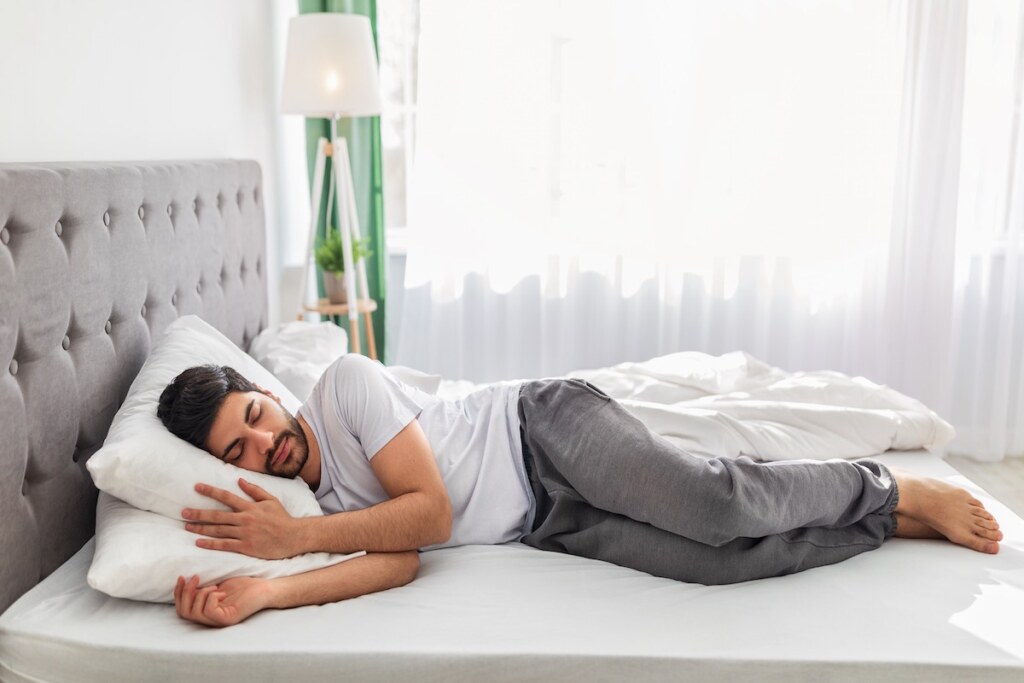
You can have the right mattress and the right adjustable bed for your arthritis, but is the way you sleep affecting the overall quality of your rest? It’s possible. Here is some more information on specific sleep positions and how they affect arthritis and back pain:
- Back sleepers (supine): Back sleepers face less problems with spinal alignment but can still have joint problems if their mattress isn’t supportive enough.
- Side sleepers: Side sleepers experience more hip, shoulder, and knee pain.
- Stomach sleepers (prone): Stomach sleepers may face issues with lower back and hip pain.
- Combination sleepers: Combination sleepers may fall asleep in one position but wake up in a totally different one, often changing throughout the night. So, depending on the amount of time in any of the above positions, the pain they experience may differ from night to night.
Bottom Line
Support for the spine and pressure relief for the joints are the two most important features to look for when choosing a mattress for arthritis. Price points vary greatly between brands, but budget-friendly options are available. Take advantage of a company’s trial period if you can’t test the mattress out in person. And if you’re ever questioning whether or not it’s time for a new mattress, ask yourself these questions: Are you consistently waking up sore, noticing dips or sags, or hearing creaking in your mattress? Do you have difficulty getting in and out of bed? If so, it’s time to start searching for your next mattress. Sleep is important for everyone, but it’s especially important if you experience chronic pain, so investing in a mattress that’s right for you can add to your overall quality of life.
How We Wrote the Best Mattresses for Arthritis Article
We reviewed mattresses based on the following criteria:
- Cost
- Warranty
- Features
- Comfort
- Size
- Materials
- Level of firmness
- Ease of delivery
- Expert sources
- Customer service accessibility and performance
- Customer satisfaction reviews
- Company reputation
Why You Can Trust Our Reviews
The bed reviews that we list follow an extensive examination of manufacturers, stated specifications, and reviews. Our reviewers are people who like comfortable beds and who want to be sure that claims made by bed-makers are ones that are backed up by performance and results.
Our ratings consider factors we list in the review: comfort, manufacturer guarantee, return policy, cost.
During our research process, we:
- Consulted with medical and sleep sources
- Surveyed different models of beds
- Spent hours researching adjustable beds
- Read hundreds of verified customer reviews
Many products and services featured on AgingInPlace.org will play a crucial role in your daily life. As these products should help enhance aging at home, we work to uncover as much as possible about the products and services we review. We also consult audiologists, geriatricians, professional adult caregivers, and other experts in the field to ensure we’re providing the most accurate, helpful information.
Frequently Asked Questions
-
Pressure on the joints is what causes most of the pain associated with arthritis. A firm mattress may help distribute your body’s weight more equally, therefore relieving pressure on the spine and other joints. Less pressure means a better night’s sleep. But the mattress shouldn’t be so firm that it has no give at all.
-
It all has to do with our circadian rhythms. The body produces less of the anti-inflammatory chemical cortisol at night, which can lead to inflammation and pain. The body also releases higher levels of melatonin and prolactin at night causing an increase in inflammatory proteins. Combine that with the fact that arthritis sufferers may already be going to bed in pain and sleeping on an incorrect mattress for their specific needs, and you have a recipe for discomfort.
-
In short, no mattress should be too firm, so something right in the middle is best. Ultimately if you have arthritis, you should be looking for a mattress with the right amount of stability and support to keep you comfortable throughout the night.
-
Most memory foam mattresses give users a “sinking” feeling as the mattress molds to their body shape. For some, this will make it harder to move and change positions during the night. A lack of movement for an extended period of time may put pressure on joints and muscles.
-
The position you sleep in depends on where your body experiences the most pain from arthritis. But in general, it’s best to sleep with your head, neck, and spine in a straight line. Side sleeping is also okay, but sleeping on your stomach isn’t recommended because your neck is twisted in an unnatural position that puts pressure on other joints in the process.
WRITTEN BY
Christina Montoya Fiedler is a Los Angeles based freelance writer with over 15 years experience writing about health and wellness. She obtained her journalism degree from Chapman University and her work can be seen in Good Housekeeping, Parents Magazine, Yahoo News, USA Today and more. In her spare time, she is taking Early Childhood Education courses to complete her teaching credentials for preschool school students.
View AuthorMEDICALLY REVIEWED BY
Brittany is a registered and licensed occupational therapist who has worked with geriatrics in assisted living and hospital settings. She holds a PhD in Integrative Mental Health, has published four books, and has written over 300 articles on a range of health topics. Brittany is the owner of Simplicity of Health, where she offers health writing and program development for health and wellness-related businesses.
View ReviewerDo you want to cite this page? Use our ready-made cite template.

